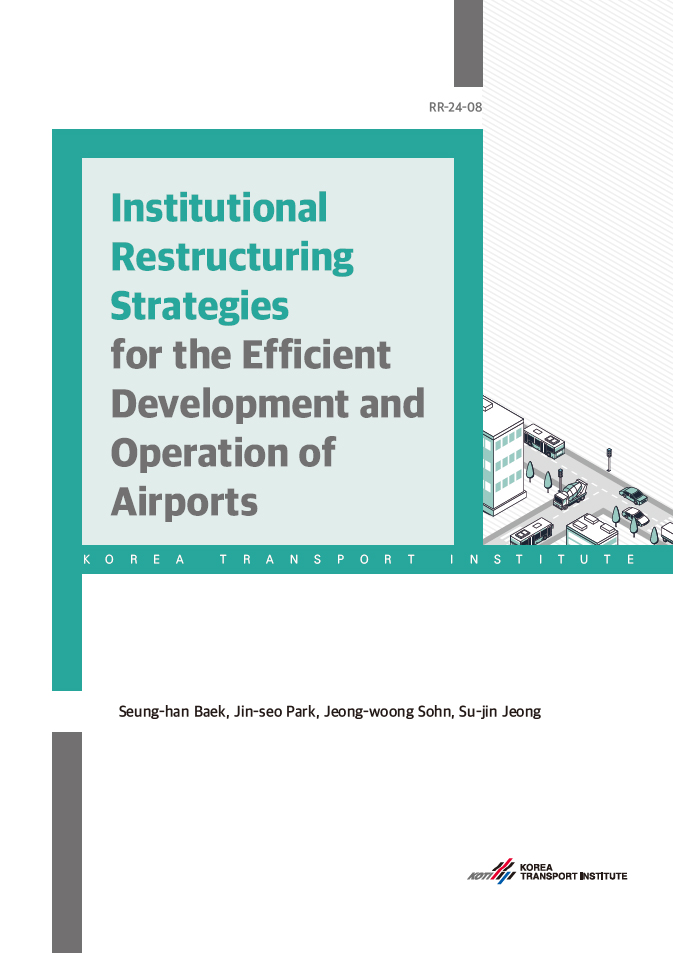Basic Report

RESEARCH
KOTI - Korea Transport institute
(RR-24-08) Institutional Restructuring Strategies for the Efficient Development and Operation of Airports
- Date
July 01 2025
- Authors
Seung-han Baek, Jin-seo Park, Jeong-woong Sohn, Su-jin Jeong
- Page(s)
15 page(s)

1. Introduction
The development and operation of airports have become critically important issues for both national and regional interests, as evidenced by the government’s ongoing promotion of eight new airport projects. These projects include the construction of new airports in locations such as Gadeokdo Island, Daegu-Gyeongbuk, Jeju (second airport), Saemangeum, Ulleungdo, Heuksando, and the Baengnyeongdo Islands, as well as civil aviation facilities at Seosan. While these development activities represent key opportunities to enhance national competitiveness, they also raise concerns such as delays in project implementation relative to initial plans, social conflict in affected regions, and the persistent deficits of regional airports.
Therefore, this is a critical time for institutional reform to ensure the efficient implementation of airport development and operation. In particular, the seventh Comprehensive Airport Development Plan, scheduled to be formulated in 2025 in accordance with Article 3 of the Airport Facilities Act, will serve as the highest-level legal planning framework in the airport sector. Thus, concrete and practical institutional reform measures proposed at this time may be reflected in future policies.
The purpose of this study is to develop a structured and efficient approach for airport development and operation in Korea and to present policy recommendations for improvement. The proposed measures are expected to contribute to the derivation of policy tasks for the seventh Comprehensive Airport Development Plan and serve as supporting data for subsequent policy implementation plans in the airport sector.
The development and operation of airports have become critically important issues for both national and regional interests, as evidenced by the government’s ongoing promotion of eight new airport projects. These projects include the construction of new airports in locations such as Gadeokdo Island, Daegu-Gyeongbuk, Jeju (second airport), Saemangeum, Ulleungdo, Heuksando, and the Baengnyeongdo Islands, as well as civil aviation facilities at Seosan. While these development activities represent key opportunities to enhance national competitiveness, they also raise concerns such as delays in project implementation relative to initial plans, social conflict in affected regions, and the persistent deficits of regional airports.
Therefore, this is a critical time for institutional reform to ensure the efficient implementation of airport development and operation. In particular, the seventh Comprehensive Airport Development Plan, scheduled to be formulated in 2025 in accordance with Article 3 of the Airport Facilities Act, will serve as the highest-level legal planning framework in the airport sector. Thus, concrete and practical institutional reform measures proposed at this time may be reflected in future policies.
The purpose of this study is to develop a structured and efficient approach for airport development and operation in Korea and to present policy recommendations for improvement. The proposed measures are expected to contribute to the derivation of policy tasks for the seventh Comprehensive Airport Development Plan and serve as supporting data for subsequent policy implementation plans in the airport sector.
[ Contents ]
1. Introduction
2. Current Status of Airport Development and Operation
3. Analysis of Key Issues in Airport Development and Operation
3-A. Analysis of DEA and Factors that Influence Efficiency in the Aviation Sector by Country
3-B. DEA and Efficiency Analysis of Korean Airports
4. Analysis of Airport Operations
4-A. Issues
4-B. Resolution Strategies
5. Strategies for Promoting Efficient Airport Development and Operation
5-A. Diversification of Airport Investment and Operation Models
5-B. Establishing a Conflict Management System
5-C. Improving Strategic Environmental Assessments
6. Conclusion and Policy Recommendations
1. Introduction
2. Current Status of Airport Development and Operation
3. Analysis of Key Issues in Airport Development and Operation
3-A. Analysis of DEA and Factors that Influence Efficiency in the Aviation Sector by Country
3-B. DEA and Efficiency Analysis of Korean Airports
4. Analysis of Airport Operations
4-A. Issues
4-B. Resolution Strategies
5. Strategies for Promoting Efficient Airport Development and Operation
5-A. Diversification of Airport Investment and Operation Models
5-B. Establishing a Conflict Management System
5-C. Improving Strategic Environmental Assessments
6. Conclusion and Policy Recommendations